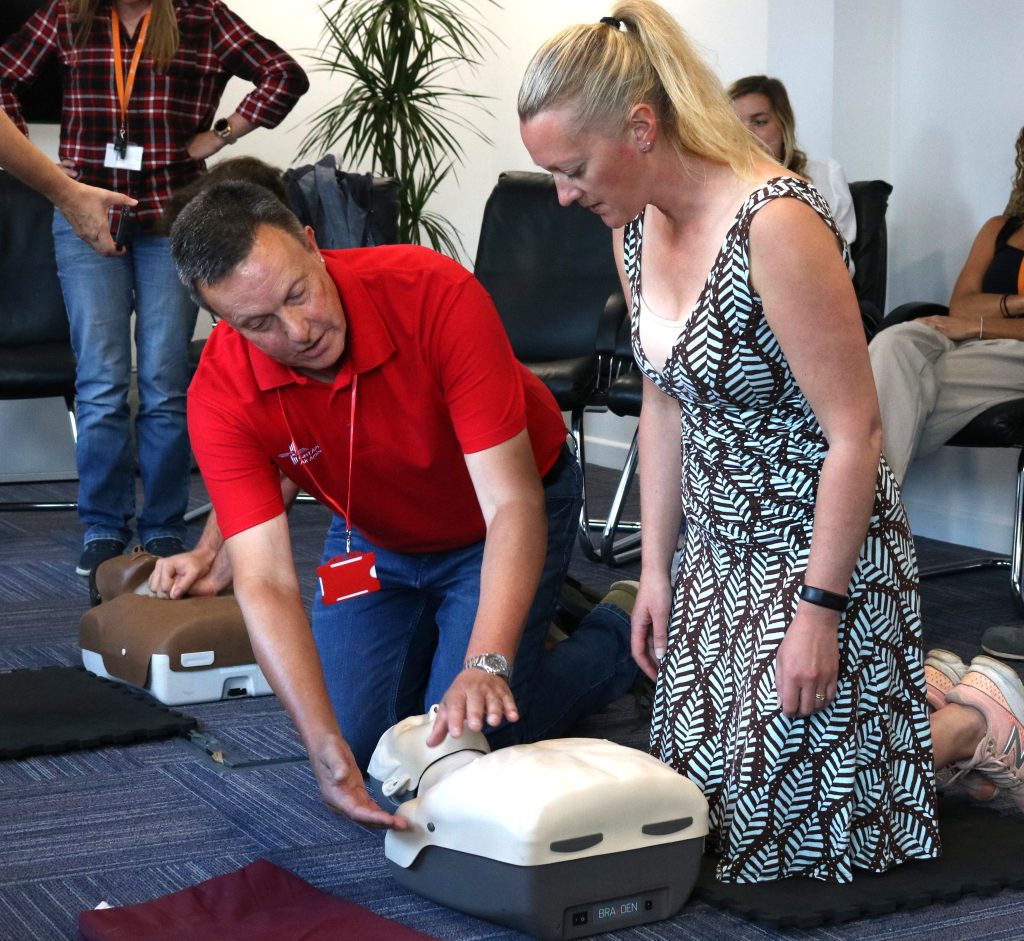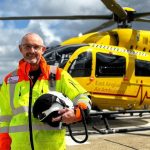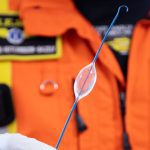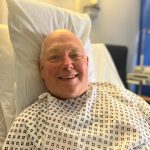19 Aug 2024
Cardiac arrest survivor training others in the skills that helped to save his life
In 2021 Dan Gilkes, then age 56 from Bury St Edmunds, suffered a cardiac arrest while he was asleep one night. His wife, Mel, quickly called 999. The call-handler talked her through how to perform CPR on her husband, while the ambulance service and East Anglian Air Ambulance (EAAA) were both called to the scene. Dan survived thanks to the prompt CPR and advanced critical care he received. As he approaches the third anniversary of his incident, he has become a volunteer with EAAA to train others in the CPR skills that helped to save his life.
In 2021 Dan Gilkes, then age 56 from Bury St Edmunds, suffered a cardiac arrest while he was asleep one night. His wife, Mel, quickly called 999. The call-handler talked her through how to perform CPR on her husband, while the ambulance service and East Anglian Air Ambulance (EAAA) were both called to the scene.
Dan survived thanks to the prompt CPR and advanced critical care he received. As he approaches the third anniversary of his incident, he has become a volunteer with EAAA to train others in the CPR skills that helped to save his life.
It was around 3 o’clock in the morning on 16 August 2021 when Dan suffered a life-threatening cardiac arrest. He says he was incredibly lucky that his wife, Mel, woke up and rang 999, and that the call handler recognised his agonal breathing and told her how to carry out CPR. This was significant in starting Dan’s chain of survival.
Dan adds that he was “gone” for between 10-12 minutes. The ambulance paramedics gave him three shocks with an AED (automatic external defibrillator), which “brought me back.” EAAA Critical Care Paramedic, Joe, arrived and provided Dan with enhanced pre-hospital care at the scene before accompanying him to the hospital, where he spent two to three days in an induced coma. He later had a S-ICD (Subcutaneous Defibrillator) fitted a week later at the Royal Papworth Hospital and returned home three weeks after his cardiac arrest to continue his road to recovery.
Dan’s experience led him to become an advocate for CPR, the skill that helped to save his life. Earlier this year, he became a volunteer CPR Trainer with East Anglian Air Ambulance to teach this skill to others. EAAA’s Community CPR Training Programme aims to teach life-saving CPR to over 20,000 people every year. This means more people can step in to perform bystander CPR and use a community defibrillator, until the arrival of the emergency services, in the event of a cardiac arrest.

Like many people, I had no idea that there was a difference between a heart attack and a cardiac arrest. By helping to train people, young and old, in CPR and AED use, hopefully we can improve the chance of survival of others who suffer a sudden cardiac arrest.

— Dan Gilkes

Medical cardiac arrests account for approximately one in four of the life-threatening emergencies that EAAA are tasked to every year. On the third anniversary of his cardiac arrest, Dan joined Simon, a fellow EAAA CPR volunteer, in training a group from Scrutton Bland, a specialist local accountant, in their Ipswich office in CPR skills and how to use an AED.
Dan says: “Like many people, I had no idea that there was a difference between a heart attack and a cardiac arrest. By helping to train others in CPR and AED use, hopefully we can improve the chance of survival of others who suffer a sudden cardiac arrest.”
EAAA’s Community CPR Training Programme Manager, Josh Lawrence, says: “As Dan’s story demonstrates, starting the chain of survival as soon as possible by performing bystander CPR really can save a life. That’s why EAAA aims to teach these skills to as many people as possible, so they know what to do and feel confident to help somebody in cardiac arrest. We are thrilled that Dan has joined the incredible team of EAAA CPR volunteers who teach this vital skill to others in the community.”
James Thurkettle, Corporate Finance Director from Scrutton Bland, who participated in the training on 16 August, said: “Having a trainer conduct the session who had a cardiac arrest himself, and wouldn’t be here if it wasn’t for CPR, was very special. Simon and Dan made the session fun and interactive and I was very impressed with the amount of equipment that they had with them so we could have a proper hands-on experience. The message I would share is that there is no reason why you shouldn’t learn CPR as you never know when you might be in a situation to need to use it.”
EAAA offer free one-hour CPR training sessions for workplaces and community groups. If you’re interested in learning more about the training, or how to become a volunteer CPR trainer with EAAA, please contact the charity on info@eaaa.org.uk or 03450 669 999.




